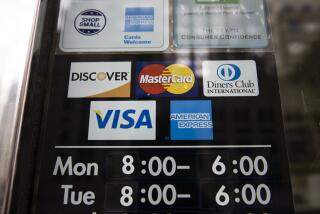Consumer Credit Has Biggest Drop in 12 Years : Economy: The contraction in April, the third straight monthly decline, represents a 6.3% annual rate.
- Share via
WASHINGTON — Consumer credit fell at its steepest rate in nearly 12 years in April as Americans kept paying off their debts, the Federal Reserve Board said Tuesday.
The $3.8-billion contraction in credit represented a 6.3% annual rate of decrease in total credit, the third straight monthly decline and the steepest rate since a 7.4% rate fall in June, 1980.
The drive to improve personal balance sheets is seen as a healthy development after the debt-ridden 1980s, but it slows the pace of recovery for an economy heavily dependent on consumer willingness to spend.
“This doesn’t reflect a strong recovery nor a very confident consumer,” said Jean Sundrla, an economist with Evans Economics Inc. in Washington. “We’re still seeing people concentrating on working down their debts.”
Spending by consumers on goods and services accounts for about two-thirds of total economic output in the United States so any weakening in credit influences companies’ production and hiring plans.
The April falloff in outstanding credit followed smaller declines of $990 million, at a 1.6% annual rate, in March and $223 million in February when credit was shrinking at a 0.4% annual rate.
Among specific major credit categories, loans to buy new cars dropped by $1.96 billion or at a 9% annual rate in April. By contrast, these loans expanded in March at a 2.1% rate.
Some economists hoped indications of strength in car sales late in May, published last week, meant this sector was regaining vigor that could take up the slack from a slowdown in housing.
Sales of new homes in April barely rose by 1.3%, and construction starts plunged by 17% from March levels. A slower pace of building and sales has extensive spinoff effects on demand for everything from plumbing fixtures to furniture.
So-called “other” credit, a grab-bag category that covers most bank loans but not home mortgages, plummeted in April by $2.48 billion, a 13.5% annual rate drop.
But consumers expanded their balances owed on credit cards, as revolving credit increased by $617 million, or at a 3% rate, in April after falling by $714 million at a 3.5% rate in March.
On Thursday, the Commerce Department is scheduled to release its report on May retail sales that will be closely watched for signs of faltering in consumer spending.
Economists surveyed by Reuters are forecasting on average that May retail business increased by 0.7% after an increase of 0.9% in April, partly on the basis of better car sales.
The trend toward paying off accumulated debts was reflected in the totals owed, on a non-adjusted basis, in April and earlier months. Americans owed $718.4 billion in April, down from $721.1 billion in March and down from the $728.1 billion they owed a year ago.
More to Read
Inside the business of entertainment
The Wide Shot brings you news, analysis and insights on everything from streaming wars to production — and what it all means for the future.
You may occasionally receive promotional content from the Los Angeles Times.










